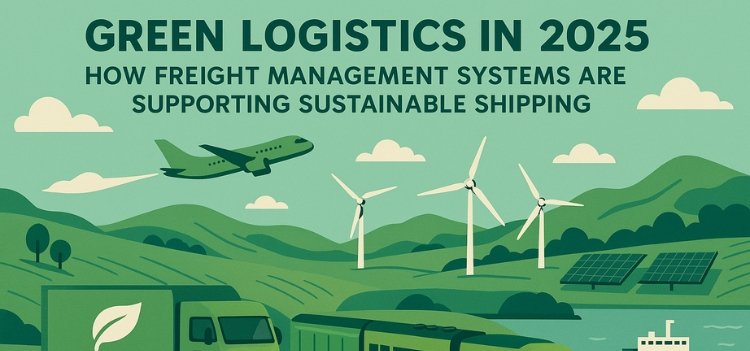Green Logistics in 2025: How Freight Management Systems Are Supporting Sustainable Shipping
Go green with smart Freight Management Systems. Uncover how digital tools support sustainable logistics and cleaner supply chains in 2025.

As climate concerns take center stage in global discussions, the logistics industry finds itself at a critical turning point. With shipping and freight accounting for nearly 11% of global carbon emissions, the need for sustainable logistics solutions has never been more urgent. In 2025, the logistics sector is undergoing a green transformation—and at the heart of this evolution lies Freight Management Systems (FMS) and Freight Forwarding Software.
These digital tools are no longer just about optimizing routes or improving delivery times. They are playing a vital role in supporting green logistics, helping companies reduce their environmental footprint while maintaining operational efficiency. Let’s explore how.
What Is Green Logistics?
Green logistics refers to sustainable practices in the transportation, warehousing, and distribution of goods that aim to minimize environmental impact. It involves:
- Reducing CO₂ emissions
- Optimizing fuel consumption
- Promoting the use of eco-friendly packaging
- Enhancing route planning to cut down mileage
- Embracing digital transformation for paperless processes
In 2025, green logistics is not just a corporate social responsibility initiative—it's a business necessity driven by stricter regulations, customer expectations, and global sustainability goals.
Role of Freight Management Systems in Sustainability
Freight Management Systems (FMS) are software solutions that help manage the end-to-end freight operations, including booking, tracking, documentation, invoicing, and analytics. When powered by modern technology like AI, cloud computing, and IoT, FMS platforms are becoming powerful enablers of green logistics.
Here’s how:
✅ 1. Optimized Route Planning = Less Fuel Waste
One of the biggest contributors to freight emissions is inefficient routing. Traditional methods often result in longer journeys, idle time, and fuel wastage.
Modern Freight Forwarding Software uses AI and real-time traffic data to optimize delivery routes. This means:
- Shorter distances traveled
- Less fuel consumed
- Reduced vehicle emissions
In 2025, smart routing is becoming a standard feature, drastically cutting down logistics carbon footprints.
✅ 2. Mode Selection for Greener Transport
FMS solutions help logistics companies choose the most sustainable mode of transport based on cargo type, urgency, and distance.
For instance:
- Rail over road (where possible)
- Ocean over air (for long-distance and non-urgent shipments)
- Multimodal transport with reduced emissions
Software-enabled decision-making helps in balancing cost, time, and environmental impact effectively.
✅ 3. Real-Time Emissions Tracking & Reporting
With increasing pressure from governments and regulatory bodies, many companies are required to report their carbon emissions transparently.
Leading Freight Management Systems now include CO₂ tracking dashboards that:
- Measure emissions per shipment
- Offer carbon intensity data by route or mode
- Generate automated ESG reports
This data enables freight companies to identify emission hotspots and take action.
✅ 4. Paperless Operations and Digital Documentation
Going digital eliminates the need for physical documents like:
- Bills of lading
- Invoices
- Shipping instructions
- Custom forms
Digital document sharing not only saves time and cost but also reduces paper waste, aligning operations with sustainability goals.
✅ 5. Fleet Management and Predictive Maintenance
An advanced FMS can integrate with IoT-enabled fleet management tools to:
- Monitor vehicle performance
- Schedule timely maintenance
- Avoid breakdowns and inefficient fuel usage
Well-maintained fleets consume less fuel and emit fewer pollutants. Predictive analytics ensures every vehicle on the road is operating at peak efficiency.
✅ 6. Collaboration for Consolidated Shipments
Empty trucks or underutilized containers are major inefficiencies in logistics. Modern Freight Forwarding Software allows collaboration between shippers and carriers to:
- Share space
- Consolidate loads
- Reduce the number of trips
This not only boosts operational efficiency but also significantly reduces the total carbon output per shipment.
Real-World Examples of Green FMS in Action
In 2025, leading logistics companies are already showcasing what’s possible with sustainable shipping tech:
- Maersk is using AI-powered FMS platforms to track carbon emissions and optimize global ocean freight routes.
- DHL has committed to zero emissions by 2050 and is using digital freight software to plan low-emission delivery routes and vehicle usage.
- Small and mid-sized forwarders are adopting cloud-based FMS to access green features without massive infrastructure investments.
The Business Case for Going Green
Adopting a green freight strategy isn’t just about the environment—it’s also good business. Here’s why:
- Cost savings from reduced fuel use and optimized routes
- Regulatory compliance to avoid penalties
- Brand reputation boost with eco-conscious customers
- Operational efficiency through digitization and automation
In short, sustainability and profitability now go hand in hand.
What’s Next for Green Logistics?
As we move forward, expect to see:
- Deeper integration between freight software and carbon offset platforms
- Widespread adoption of electric trucks and sustainable fuels
- AI-driven recommendations for eco-friendly carriers and suppliers
Freight Management Systems will continue to evolve, becoming central to achieving net-zero supply chains.
✅ Final Thoughts
The journey to green logistics starts with the right tools. In 2025, Freight Forwarding Software and Freight Management Systems are not just about managing freight—they're about managing impact.
Companies that invest in sustainable digital logistics platforms today are building a smarter, cleaner, and more future-ready supply chain.
What's Your Reaction?

















